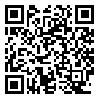BibTeX | RIS | EndNote | Medlars | ProCite | Reference Manager | RefWorks
Send citation to:
URL: http://jhsme.muq.ac.ir/article-1-116-en.html
2- Department of Clinical Psychology, Allameh Tabataba'i University, Tehran, Iran
3- The Research Institute of Howzeh and University, Qom, Iran
Background and Objectives: Spiritual intelligence makes a major contribution to people’s health and well-being. Since religion is considered as an enriched context for Muslim communities, which can provide them with spiritual experiences, the aim of this study was to develop and validate a questionnaire in order to assess spiritual intelligence among people in these communities.
Methods: In this study, 10 components derived from the literature were examined using Islamic texts and interviews with Islamic scholars. Applying the expert opinion method, the items of interest were made. The developed questionnaire was then administered on a sample of 350 students from Tehran University and seminaries in Tehran selected by stratified sampling to establish its factor structure, validity, and reliability.
Results: Nine items were omitted in the preliminary conduction of the questionnaire. Following the explanatory factor analysis, six more questions were also eliminated due to their factor loadings being less than the critical value of 0.3. The Scree plot revealed that the factor structure of the questionnaire consisted of five main components which determined 36.99 percent of the total variance. Moreover, the Cronbach’s Alpha was obtained to be 0.92 which showed a proper internal consistency. Using King’s SISCI-24 questionnaire, the concurrent validity was also deemed relatively acceptable.
Conclusion: The main strength of this study was the development of a contextually competent instrument to assess spiritual intelligence among Muslim people. This questionnaire instrument showed relatively acceptable reliability and validity, and can be used in future research, especially in health sciences, among the population of interest.
Received: 2016/08/28 | Accepted: 2016/08/28 | Published: 2016/08/28
| Rights and permissions | |
 |
This work is licensed under a Creative Commons Attribution-NonCommercial 4.0 International License. |







